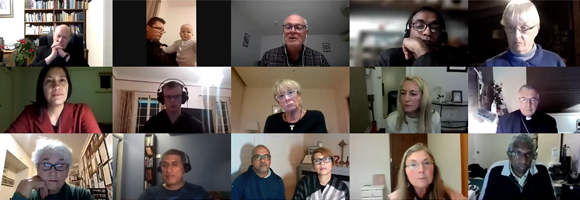In his 1988 Apostolic Exhortation Christifideles Laici, Pope St John Paul II wrote of the Gospel’s call to be labourers in the vineyard[1] and to transform the world according to God’s plan. This document also offered guidance for groups of lay faithful who wanted to “labour in the vineyard”, while remaining in communion with the Church and drawing upon the charisms gifted to them by the Holy Spirit.
Such ecclesial communities have long been an important element of the Catholic Church. In Australia, these communities have proven to be influential in bringing vitality and energy to the life of the Church.
Recently, the Bishops Commission for Evangelisation, Laity and Ministry (BCELM) decided to bring together representatives from the many ecclesial communities operating in Australia. This event was in the form of an online consultation on July 20, hosted by that Commission’s chairman, Archbishop Christopher Prowse, and Archbishop Julian Porteous, Bishop Delegate for Ecclesial Communities, who wrote:
The emergence of ecclesial movements in recent times are a gift to the Church and the Australian bishops would like to encourage and support their life and mission.
The gathering, the first of its kind in many years, brought together about 100 people representing about 50 groups.
Gathered in small groups, participants were first asked to answer the question: “How can the Bishops Commission nurture and support your community’s life and mission?” While there were many constructive ideas put forward, the overwhelming response was the need for the ecclesial communities “to be known”. As one person wrote:
It would be good for the bishops (or a delegate) to visit our communities and see the works we do. Not just a directory, but an intimate knowledge of our communities.
The second question discussed was: “How can you support each other to enhance the life and impact of ecclesial communities in Australia?” Again, there were several suggestions put forward, with many highlighting the need to work together and “not in silos”, and ways to bring their gifts and talents to the broader Catholic community.
One of the groups responded with:
We all need to bear in mind that we are parts of the body of Christ, and we can't be all parts. We are all called to fish for souls, and the ocean is big enough for us all; we shouldn't be pushed into one box of uniformity, and parishes need to be more than just places for Sunday Mass.
In his closing remarks, Archbishop Porteous noted:
This is a moment of encouragement and inspiration and a clear indication that the Holy Spirit is present and active in the Church here in Australia.
Communities are a great gift. They’re a very particular gift at this moment in our history. We’ve always had various movements in the Church, but there is a fresh outpouring of grace associated with the movements in our time.
I’m hoping… we can build those relationships between the bishops and the various ecclesial movements, and through this we’ll be able to work closer together, more in harmony with one another and together advance the life and mission of the Church in Australia.
This timely consultation builds upon the Plenary Council’s synodal methodology of listening and journeying together. Through this process, the consultation identified ways in which Church leadership might respond and, as well, how local communities might also respond individually and together.
A gift of the Holy Spirit, ecclesial communities have the responsibility to listen to how God is calling them to renewal and how to be missionary in today’s world. In so doing, they seek the support of bishops and Church leaders so that they may continue to add to the rich mosaic that is the Catholic Church.
Let us be open to their gifts and pray for their mission in Australia.
To register your ecclesial community with the ACBC for future consultations and updates, please go to https://nce.catholic.org.au/ecclesialcommunities
Words: Sharon Brewer
[1] Matthew 20:3-4, Section 1, Christifideles Laici.



